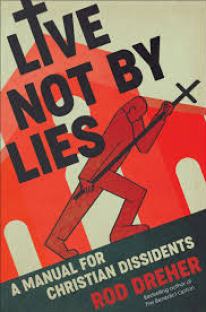Reviewed by:
G. Connor Salter, Professional Writing alumnus from Taylor University, Upland, IN.
Title:

Live Not By Lies: A Manual for Christian Dissidents
Author:
Rod Dreher
Publisher:
Sentinel (an imprint of Penguin Random House)
https://www.penguin.com/publishers/sentinel
Publication Date:
September 29, 2020
Format:
Hardcover
Length:
256 pages
OVERVIEW
In 2015, journalist Rod Dreher was contacted by a man whose family had immigrated from the Soviet Bloc. The man cited some concerns his mother had brought up about the way Americans were discussing politics, the sense that having conservative values was dangerous and that Americans could be ostracized for having them. In other words, the mother was concerned that America was moving toward something like a Soviet nation.
Dreher initially found this idea foolish, but interviewed the mother and various other Christians who’d lived under Soviet communism. He found many of them had the same concerns: America seemed to be drifting to its own version of totalitarianism. Collecting their stories and historical research on Russia’s Bolshevik Revolution, Dreher points out haunting parallels between the Soviet era and current trends in American culture. After contemplating these connections and what totalitarianism would look like in a Western context, Dreher shares stories about how Christians survived under Soviet persecution, keeping their faith and raising children who inherited their faith. Dreher highlights principles that came up across these stories, helping American Christians see what they’ll need to survive as Christians if they end up in a totalitarian society.
There’s nothing essentially new about looking at American society and criticizing it as having drifted from Christianity. Plenty of people have made that point in other books, and many Christian publications and small-town newspapers are filled with editorials by Christians describing X or Y trend as proof that persecution is eminent. What really sets Dreher apart from so many Christian alarmists is two things.
First, he does his research. Alarmists tend to spend half their time talking in highly personalized, subjective terms about the America they grew up in and use that as the basis for their critique of contemporary America. Occasionally those writers will bring up examples of Christian persecution in other countries to make a point, but they rarely talk about these examples in an in-depth way. One gets the sense they’re throwing the examples in just to be shocking. Rather than give his own subjective view, Dreher focuses on what people who’ve lived under Soviet communism think. In the introduction, he admits he was skeptical of their ideas about where American culture is going, and then alarmed when they explained their concerns. When he comments or analyzes what they describe, he uses their examples or quotes from historical sources. He’s also careful to note that if American does become a totalitarian country, the result would look different from the Soviet Bloc; technology and cultural changes mean it would be a “soft totalitarianism” which may not announce its atheistic interests. This puts him in sharp contrast with Christian writers who pick one thing that frightens them, analyze it poorly and claim it as proof that gulags or death camps are coming in five years. Dreher’s choice to focus on the research and give contextualized predictions grounds his ideas, making them much more credible.
Secondly, Dreher doesn’t put his ideas into a strictly right-versus-left, conservative-versus-liberal discussion. Several times throughout the book, he notes that part of what seems to be happening in America is a change from classic liberalism (which prioritizes caring for individuals) to a tribal liberalism (which prioritizes one’s group above everything else regardless of the group’s morals). He also points instances where American conservatives have promoted unhealthy “us versus them” thinking that has only made things worse. When he notes how fashionable left wing politics have become among millennials, he admits part of the problem is few Generation Xers and Baby Boomers passed on stories about what communism is and what it looked like (this is even true in Eastern European countries). In short, he never buys into the easy narrative that the elderly did everything right and the young ruined everything; he admits that many times the young ruin things because the elderly didn’t pass on their values. By making a nuanced argument, Dreher not only helps Christians realize what direction their culture is going, he encourages them to repent that they haven’t done more to stop it and didn’t see these things coming.
All in all, Dreher produces something that is all too rare: a Christian book that critiques American culture without whining about how “nothing’s the same anymore” and falling into easy nostalgia. He makes strong arguments that things are getting darker, then pushes American Christians to both be aware of their mistakes and to prepare for the future.
A well-argued, relevant and eye-opening book.
ASSESSMENT
Rating (1 to 5 stars)
5 stars
Suggested Audience
Christians interested in what it looks like to build churches and Christian families in a persecuted context, and in understanding alarming trends in American culture.
Christian Impact
Dreher helps readers understand the value of Christianity in creating a culture that truly values individuals, as well as the ways that Christians can build a faith that sustains pressure and attacks of various kinds.


 November 12, 2020
November 12, 2020 



No comments yet... Be the first to leave a reply!